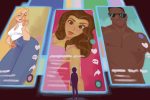Turning Affliction into Action
Ball State freshman Heather Stafford shares her story of surviving and thriving in the face of anorexia nervosa.
By Alicia Drier, Roosevelt University
It has been almost two years since Heather Stafford was first diagnosed with anorexia nervosa. And now that she’s on the path to recovery, she’s never looking back.
Most people don’t get too excited when their stomach makes any sort of noise. The word “hangry” has risen in popularity to describe that perfect blend of pissed off and hungry that the average person reaches right before lunch. But, when Stafford feels her stomach rumbling, her entire face breaks out in a wide grin.
“I am aware of the time, all the time,” she says. “Because I ignored my hunger cues for so long, I don’t have them as often as I should. I can very easily skip lunch by accident, simply because my body doesn’t always send out any signals to remind me it’s time to eat. So more often than not, I let the clock tell me when it is time to eat and slowly but surely my hunger cues are returning.”

A survivor of childhood sexual abuse, Stafford began practicing eating-disorder-based behavior as early as 2012. It wasn’t until her junior year, in February 2015, that Stafford received an official eating disorder diagnosis. As a 96-pound 17-year-old, she began to see a counselor twice a week and a dietician once a week. She was not allowed to know her physical weight, and after fainting twice in public locations, she was asked to pass over her diet pills and cut back on her caffeine and nicotine intake permanently.
But, at the time, Stafford couldn’t see past the rush she felt every time she weighed herself
“The behaviors put me in a partially numb state which I thought was better than being sad. Whenever I stood on the scale and I had lost weight, I was unbelievably elated. It felt like a high to me. What I didn’t realize, until it was too late, was the crushing lows I could get when I found out I had gained as well,” she says.
All of this changed the summer before her senior year of high school, when Stafford self-admitted to a nine-week recovery program at Selah House, an eating disorder treatment center.
“I was trying to choose between going on a mission trip with my youth group or staying home and admitting that I needed help that summer. My youth director told me to pray about my decision, and that was when I started to realize that maybe my experiences could be used to help someone else someday, someone like me. That was when I finally found the strength to admit I needed help. I really feel that God called me to go to Selah House for treatment,” she says.
Now Stafford has finished a semester at Ball State University, and it’s not just her stomach that she has come to listen to.
“My support system has expanded even more so since I went to college,” she says. “I still regularly communicate with my therapist and dietitian back home, but now I also have friends and a counselor on campus to talk to when I have immediate needs. I’ve also joined an eating disorder support group here on campus which has helped in more ways than I ever expected.”
She has also come to understand the language of self-care.
“I now allow myself to take breaks,” Stafford says. “When I’m studying I always make myself stop every now and then just to watch the latest Jenna Marbles video or color in my “Chill the F*ck Out” coloring book for a bit. Outside of that, I make more effort to just feel better about myself. Some days, that might mean something as simple as painting my nails or putting on nice smelling lotion.”
Stafford also attributes her eating disorder recovery for her discovery of a unique, new extracurricular activity on campus. She joined the Ball State Belly Dance Club in October 2016, a group that, according to its website, “promotes women empowerment and confidence.”
For Stafford, the group has given her a healthy outlet for exercise. “Exercise can do wonders for your mood, but was something I abused a lot when I was deep in my eating disorder. Belly dancing now allows me to include physical activity in my life, while also building my confidence about my body and having fun.”
Moving forward, Stafford hopes to remain a lifelong advocate for mental health and eating disorder recovery.
“When I got back from Selah House, I was on fire for this cause that is so personal to me. This led me to not only participate in the fundraising walk for the National Eating Disorder Association in Fort Wayne, but I also set up a whole team of walkers through my high school last year with the help of an amazing teacher. This year I’ll definitely be at the walk again, and I’m participating in all the eating disorder awareness raising events at my college.
“The ultimate goal I have for my future is to become a licensed therapist who works with teens. I want to help people the way I have been helped. I have an insight about mental health issues that I think will really help people, and I want to share that with those who need it most.”
When days are hardest and she finds herself falling back into her old habits, Heather turns to a quote from her favorite book. “Laurie Halse Anderson’s book ‘Wintergirls’ inspires me. I find a lot of books involving eating disorders focus on how sick a person is, and then they switch to recovery very quickly in the end to wrap up the story in a nice little package. ‘Wintergirls’ shows that transition in a way I find relatable. The last words in the book are ‘I am thawing,’ which I recently got tattooed on my rib cage. Now every time I look in the mirror, I am reminded that recovery is a daily journey. I am not alone in my struggle. And I am so fucking proud of where my life is going from here.”
To learn more about eating disorder care and ways to give back to this community, please visit the NEDA donation page.
You can also follow Stafford recovery journey on Instagram here.

















